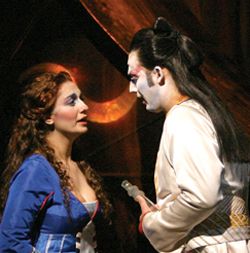|
|
|
|
|
|
|
|
| Opera News/Januar 2007 |
| FRED COHN |
Mozart: Die Zauberflöte, Metropolitan Opera, October 2006
|
NEW YORK CITY — Die Zauberflöte, the Metropolitan Opera, 10/7/06
|
|
 Die Zauberflöte is at heart an operatic
bildungsroman, a series of adventures through which the hero Tamino gains
maturity and spiritual awareness. This is often unclear in performance.
Papageno's slapstick, the Queen of the Night's high F and Sarastro's low E
all vie for our attention; in their midst, Tamino can seem like a young man
who wanders on now and again to make pretty tenor noises. No such confusion
afflicted the Met's October 7 matinée, the opera's season premiere. As
embodied by Jonas Kaufmann, Tamino emerged as the work's lodestar.
Kaufmann's brilliant tenor proclaimed the character's primacy; it became the
organizing principal around which the opera's universe of extraordinary
sounds was arranged. When he maintained his vow of silence in Act II, the
voice's very absence made itself felt: the distinctive sound — lyricism writ
large — remained a phantom presence. Die Zauberflöte is at heart an operatic
bildungsroman, a series of adventures through which the hero Tamino gains
maturity and spiritual awareness. This is often unclear in performance.
Papageno's slapstick, the Queen of the Night's high F and Sarastro's low E
all vie for our attention; in their midst, Tamino can seem like a young man
who wanders on now and again to make pretty tenor noises. No such confusion
afflicted the Met's October 7 matinée, the opera's season premiere. As
embodied by Jonas Kaufmann, Tamino emerged as the work's lodestar.
Kaufmann's brilliant tenor proclaimed the character's primacy; it became the
organizing principal around which the opera's universe of extraordinary
sounds was arranged. When he maintained his vow of silence in Act II, the
voice's very absence made itself felt: the distinctive sound — lyricism writ
large — remained a phantom presence.
Kaufmann was immensely helped by Julie Taymor's celebrated production
(new to this reviewer). I went to this performance expecting to be wowed by
spectacle; on that level, the production delivered, but what was surprising
was how apposite the visual inventions were to the work at hand. By
presenting Sarastro's realm as a succession of wonders, it encourages us to
share Tamino's awe through the various steps in his journey. The disparate
elements that comprise Zauberflöte can cause a performance of the opera to
come apart at the seams; Taymor's interpretation made for an unusually
coherent piece of musical theater.
The cool, instrumental beauty of Isabel Bayrakadarian's soprano, with its
subtle, quick vibrato, evoked great Mozart singers of past generations; the
only element that hampered her Pamina was her somewhat occluded German
diction. Nathan Gunn brought to Papageno's stage business an infectious
exuberance that unfortunately did not always carry through to his singing;
"Ein Mädchen oder Weibchen" in particular seemed to lie too low for him.
Tessitura proved a problem, too, for bass Stephen Milling; the voice tended
to disappear on those low notes where one expects a Sarastro to assert his
authority. Erika Miklósa was a lightweight Queen of the Night, fluent at the
top but lacking in bite below the staff. Eike Wilm Schulte's shallow tone
proved insufficiently noble for the speaker, but Volker Vogel was a
wonderful Monastatos — grotesque, funny and even touching. Conductor Scott
Bergeson led a judiciously paced performance and drew from the Met orchestra
luminous sonorities fully as magical as the marvels unfolding onstage. |
|
|
|
|
|
|
|
|
|
|
|
|
|
|
|
|
|
|